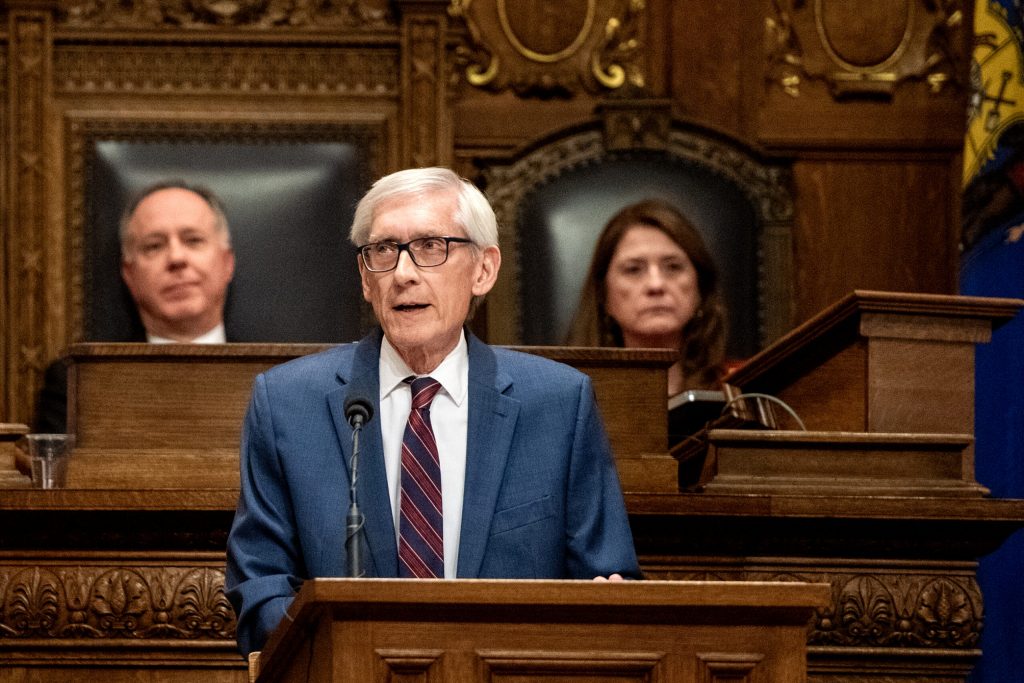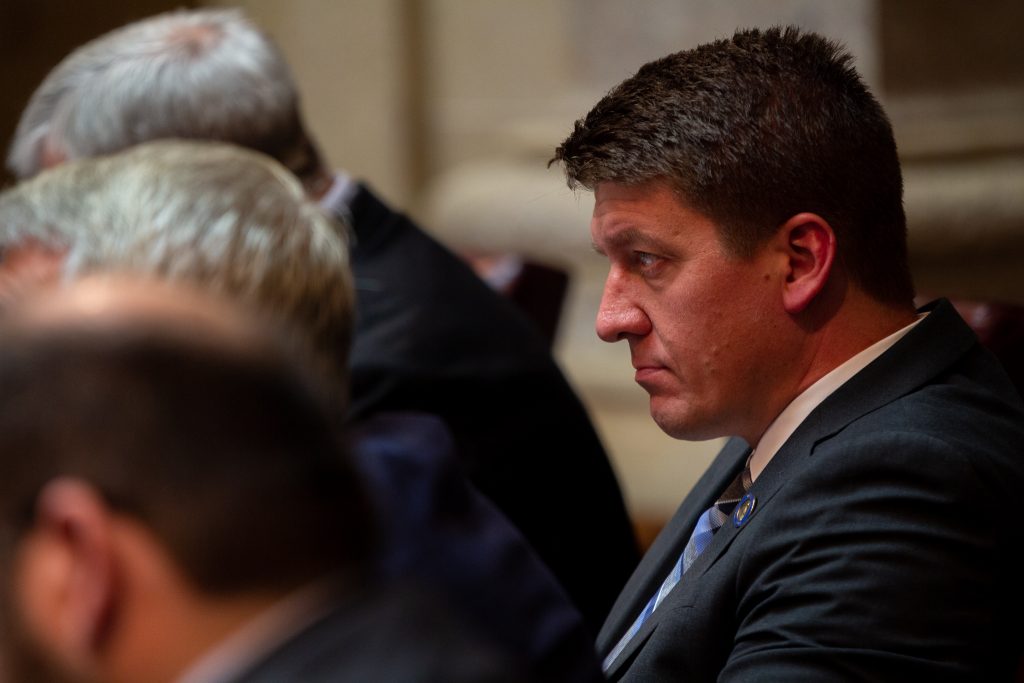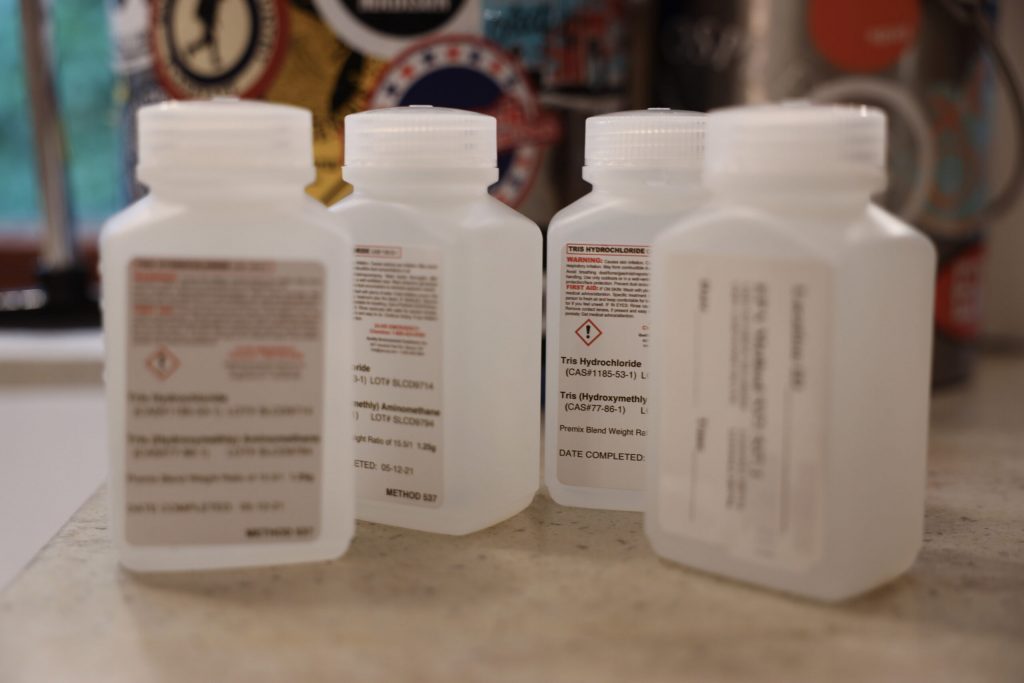Evers Announces $145 Million Plan to Address PFAS
His new budget will fund new grant programs, staff, testing and research.

Gov. Tony Evers delivers the State of the State address Wednesday, Jan. 22, 2025, at the Wisconsin State Capitol in Madison, Wis. Angela Major/WPR
In a sweeping proposal, Gov. Tony Evers announced Tuesday that his budget will include more than $145 million to address PFAS contamination and exempt innocent landowners from paying to clean up pollution from the harmful chemicals.
The Democratic governor said his proposal would fund new grant programs, staff, testing and research to understand the scope of the problem and eliminate PFAS. Evers also unveiled a new effort to craft groundwater standards for six PFAS chemicals, and he proposed adoption of a Democratic-led bill that would change state laws to improve water quality.
Evers is set to unveil his plan for the next two-year state budget on Feb. 18, and Republican lawmakers have already vowed to strip many of his proposals.
The Democratic governor said his plan to combat PFAS contamination would be largely funded through $125 million he and the GOP-controlled Legislature set aside under the current budget. Nearly 600 days since the budget passed, the money has yet to be released as the governor and lawmakers have sparred over how to spend the funds.
Evers’ plan would devote more than $100 million to new grant programs. The bulk of the money would fund PFAS testing for municipal drinking water systems, but it would also help private well owners test for the chemicals. About $26.5 million would go toward researching ways to destroy and dispose of PFAS, as well as sampling and testing to gauge the scope of the problem. About $6.4 million would go toward grants for local businesses and communities to eliminate the use of PFAS.
The governor’s proposal would also provide nearly $2 million for emergency response, including the provision of bottled water to households facing PFAS contamination. The plan would also create 10 full-time positions at the state Department of Natural Resources and one position at the Department of Health Services through nearly $1.8 million over the biennium. State health officials would also receive nearly $1.3 million for studies to monitor PFAS exposure among residents.

Wisconsin state Sen. Eric Wimberger, R-Green Bay, is photographed during a state Senate session on June 28, 2023, in the Wisconsin State Capitol building in Madison, Wis. Drake White-Bergey/Wisconsin Watch
Evers proposes liability exemptions for innocent landowners
Last year, GOP lawmakers introduced a bill that would’ve spent the $125 million on grants for local governments, landfills and landowners facing PFAS pollution through no fault of their own. In April, Evers vetoed the bill over fears it would limit the DNR’s authority to require polluters to test and clean up contamination under the law.
Sen. Eric Wimberger, R-Oconto, has criticized the DNR for allowing continued spreading of contaminated sewage sludge, and he pressed for changes to protect innocent landowners.“
An attempt by an innocent landowner to get clean water or help remediate pollution will financially ruin them,” Wimberger wrote in a Dec. 20 letter. “Our laws should not make doing the right thing a life-changing dilemma for innocent parties.”
Evers said his budget would increase sampling, testing and cleanup of PFAS in sewage sludge through $7 million in new state funding. His proposal would also bar spreading of biosolids with high PFAS levels.

Madison resident Brad Horn collects a water sample to test for PFAS in Madison, Wis., on Aug. 8, 2022. His family tested the water that came out of their AquaRain brand water filter and sent the water to the Regional Water Authority in Connecticut for testing. The results came back with no detectable levels of PFAS in 17 categories and one result of “below Minimum Reporting Level but greater than the Method Detection Limit” for PFHxS. Coburn Dukehart/Wisconsin Watch
Evers unveils new effort to craft standards for 6 PFAS chemicals
Evers also approved new rulemaking for six PFAS after the Environmental Protection Agency finalized drinking water standards for the chemicals last year. The DNR is proposing identical limits to federal regulators of 4 parts per trillion for PFOA and PFOS, as well as 10 parts per trillion for PFNA, PFHxS and HFPO-DA or GenX chemicals. It also sets levels for a mix of two or more of the chemicals PFNA, PFHxS, PFBS and GenX Chemicals.
A 2017 law passed by GOP lawmakers forced the DNR to abandon groundwater standards for PFAS in 2023 after previous attempts to set limits in groundwater failed. The law known as the REINS Act aimed to limit excessive compliance costs of regulations.
PFAS, short for per- and polyfluoroalkyl substances, are a class of thousands of synthetic chemicals widely used by industry since the 1940s. They’re found in everyday products like nonstick cookware, stain-resistant clothing, food wrappers and firefighting foam. The chemicals don’t break down easily in the environment.
Research shows high exposure to PFAS has been linked to kidney and testicular cancers, fertility issues, thyroid disease and reduced response to vaccines over time.
The chemicals have been found in public and private wells in communities large and small. They include the towns of Campbell, Stella and Peshtigo along with the cities of Madison, Eau Claire and Wausau. About 90 public water systems in Wisconsin must now treat their water or drill a new well to meet the federal regulations, according to the DNR.
Editor’s note: This story will be updated.
Evers proposes $145M plan to address PFAS in his next budget for Wisconsin was originally published by Wisconsin Public Radio.
If you think stories like this are important, become a member of Urban Milwaukee and help support real, independent journalism. Plus you get some cool added benefits.
More about the PFAS Problem
- PFAS Levels in Great Lakes Fish Are Dropping - Danielle Kaeding - Feb 6th, 2026
- Gov. Evers and GOP Lawmakers Near a Deal on PFAS Pollution - Danielle Kaeding - Jan 22nd, 2026
- Gov. Evers Optimistic About Reaching Final Deal With Republican Lawmakers to Secure Release of $125 Million in Long-Awaited Pfas Investments - Gov. Tony Evers - Jan 21st, 2026
- Bipartisan Push to Tell Counties Faster When Water Tests Fail - Henry Redman - Dec 19th, 2025
- MKE County: County Seeks to Sue PFAS Producers, Oil Companies - Graham Kilmer - Dec 10th, 2025
- Wisconsin Reviewing EPA-Approved Pesticides For PFAS - Danielle Kaeding - Dec 9th, 2025
- State Nears Settlement with Johnson Controls/Tyco Over PFAS Spills - Danielle Kaeding - Dec 4th, 2025
- Senate Bill Promotes Soybean-Based Firefighting Foam to Replace PFAS - Danielle Kaeding - Dec 2nd, 2025
- Test Results Show High PFAS Levels in Wisconsin’s Landfill Runoff - Danielle Kaeding - Dec 2nd, 2025
- Wisconsin Communities Get $282 Million for Drinking Water Projects - Danielle Kaeding - Nov 19th, 2025
Read more about PFAS Problem here



















